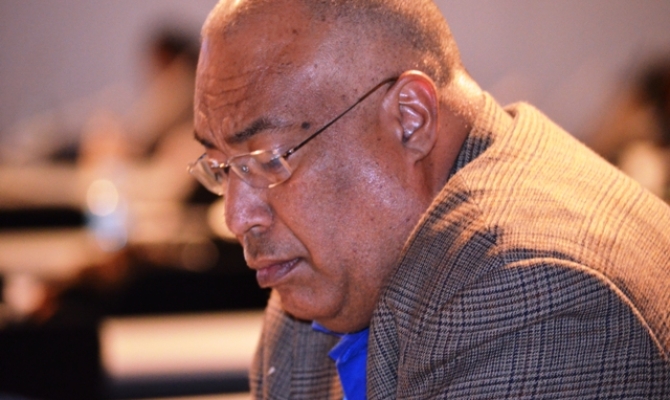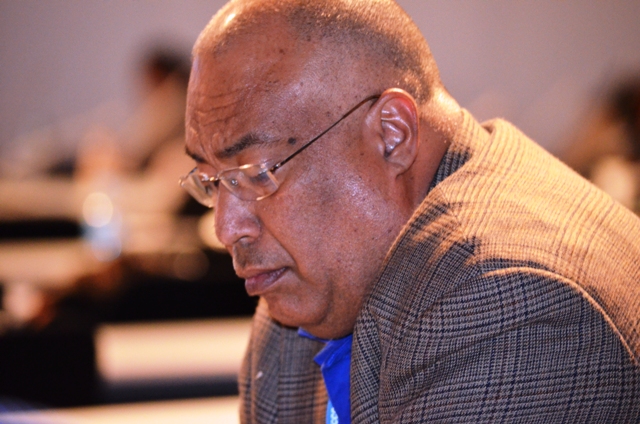
Climate Change Resilience
By Samisoni Pareti, Editor in Chief, Islands Business Magazine in Paris amplifying the Pacific Voice at COP21
29 November, 2015, Paris, France, COP21 - As world leaders began to arrive in the French capital to finalise a global agreement on climate change, almost all the independent islands of the Pacific have submitted their new climate action plan.
Known as Intended Nationally Determined Contribution, INDC for short, these plans outline among things carbon emission reduction targets each country is committed to. Two island nations, Tuvalu and Palau submitted their INDCs the last 48 hours, on the eve of the opening of the final rounds of climate change negotiations in Paris.
Up to Saturday, 28 November, 183 countries that are members of the UNFCCC have submitted their INDCs, including all 14 members of the Pacific Islands Forum, save Tonga. Marshall Islands was the first to submit their climate action plan, it was done on 21st July. Kiribati followed then Vanuatu, Solomon Islands, Papua New Guinea, Fiji, Nauru, Cook Islands, Samoa, Federated States of Micronesia, Niue, Tuvalu and Palau.
Most of the island leaders were in Paris at the beginning of the week to attend the French Oceania Summit with French President, Francois Hollande, which was held at the Elysee Palace on Thursday. President Hollande left one hour after attending the Summit to fly to meet Russian leader Vladamir Putin, busy putting a coalition to fight the ISI in Syria.
Pacific leaders who are members of the Commonwealth grouping – eleven in total including Australia and New Zealand -- left for the Commonwealth Heads of Government Meeting (CHOGM) in Malta on Thursday night in an aircraft chartered by the French Government. They all met up with President Hollande again at this Mediterranean island nation who was there to lobby for the Commonwealth's support for the fight against terrorist attacks in his country. Most Pacific leaders return to Paris on Sunday, before the start of COP21 on Monday.
UNFCCC in a media statement it released on Friday quoted its Executive Secretary Christiana Figueres as encouraging countries to come forward with their INDCs as soon as they are able, as this underlines their commitment and support towards a successful outcome in Paris.
This Paris agreement, the UNFCCC statement adds will come into effect in 2020, empowering all countries to act to prevent global temperatures rising above 2 degrees Celcius, and to reap the many opportunities that arise from a necessary global transformation to clean and sustainable development.
At the French Oceania Summit held at the Elysee Palace in Paris, the need for member countries to submit their INDC earned a paragraph in the five-page summit declaration.
No figure on the temperature rise target was mentioned in the document, neither a 2 degrees Celcius nor a 1.5 degrees. Island officials who attended the summit said a draft declaration circulated by the French had suggested a 2 degrees target, but the proposal didn't get the support of the island leaders.
 Ambassador Collin Beck of the Solomon Islands at COP 20 in Lima, Peru in 2014
Ambassador Collin Beck of the Solomon Islands at COP 20 in Lima, Peru in 2014
Solomons' Permanent Representative to the UN, Ambassador Collin Beck told us in Paris that Pacific island nations will accept nothing more than the 1.5 degrees or lower target.
"If we don't get Paris right, Paris is the beginning of the end for many of the vulnerable countries so the issue of global temperature below 1.5 is the heart and soul of the whole convention," said Ambassador Beck.
"So I think it is important that we get the temperature right, most importantly and critically this is our last chance, if we don't get an agreement now then the window will more or less close shut on us. The urgency of getting an agreement, comprehensive and ambitious to guide the survival of SIDS is critical now. It's now or never."
The 21st Conference of the Parties to the United Nations Convention on Climate Change is hosted in Paris, France from 30 November to 11 December, 2015 - #4PacIslands
29 November, 2015, Paris, France, COP21 - As world leaders began to arrive in the French capital to finalise a global agreement on climate change, almost all the independent islands of the Pacific have submitted their new climate action plan.
Known as Intended Nationally Determined Contribution, INDC for short, these plans outline among things carbon emission reduction targets each country is committed to. Two island nations, Tuvalu and Palau submitted their INDCs the last 48 hours, on the eve of the opening of the final rounds of climate change negotiations in Paris.
Up to Saturday, 28 November, 183 countries that are members of the UNFCCC have submitted their INDCs, including all 14 members of the Pacific Islands Forum, save Tonga. Marshall Islands was the first to submit their climate action plan, it was done on 21st July. Kiribati followed then Vanuatu, Solomon Islands, Papua New Guinea, Fiji, Nauru, Cook Islands, Samoa, Federated States of Micronesia, Niue, Tuvalu and Palau.
Most of the island leaders were in Paris at the beginning of the week to attend the French Oceania Summit with French President, Francois Hollande, which was held at the Elysee Palace on Thursday. President Hollande left one hour after attending the Summit to fly to meet Russian leader Vladamir Putin, busy putting a coalition to fight the ISI in Syria.
Pacific leaders who are members of the Commonwealth grouping – eleven in total including Australia and New Zealand -- left for the Commonwealth Heads of Government Meeting (CHOGM) in Malta on Thursday night in an aircraft chartered by the French Government. They all met up with President Hollande again at this Mediterranean island nation who was there to lobby for the Commonwealth's support for the fight against terrorist attacks in his country. Most Pacific leaders return to Paris on Sunday, before the start of COP21 on Monday.
UNFCCC in a media statement it released on Friday quoted its Executive Secretary Christiana Figueres as encouraging countries to come forward with their INDCs as soon as they are able, as this underlines their commitment and support towards a successful outcome in Paris.
This Paris agreement, the UNFCCC statement adds will come into effect in 2020, empowering all countries to act to prevent global temperatures rising above 2 degrees Celcius, and to reap the many opportunities that arise from a necessary global transformation to clean and sustainable development.
At the French Oceania Summit held at the Elysee Palace in Paris, the need for member countries to submit their INDC earned a paragraph in the five-page summit declaration.
No figure on the temperature rise target was mentioned in the document, neither a 2 degrees Celcius nor a 1.5 degrees. Island officials who attended the summit said a draft declaration circulated by the French had suggested a 2 degrees target, but the proposal didn't get the support of the island leaders.
 Ambassador Collin Beck of the Solomon Islands at COP 20 in Lima, Peru in 2014
Ambassador Collin Beck of the Solomon Islands at COP 20 in Lima, Peru in 2014Solomons' Permanent Representative to the UN, Ambassador Collin Beck told us in Paris that Pacific island nations will accept nothing more than the 1.5 degrees or lower target.
"If we don't get Paris right, Paris is the beginning of the end for many of the vulnerable countries so the issue of global temperature below 1.5 is the heart and soul of the whole convention," said Ambassador Beck.
"So I think it is important that we get the temperature right, most importantly and critically this is our last chance, if we don't get an agreement now then the window will more or less close shut on us. The urgency of getting an agreement, comprehensive and ambitious to guide the survival of SIDS is critical now. It's now or never."
The 21st Conference of the Parties to the United Nations Convention on Climate Change is hosted in Paris, France from 30 November to 11 December, 2015 - #4PacIslands